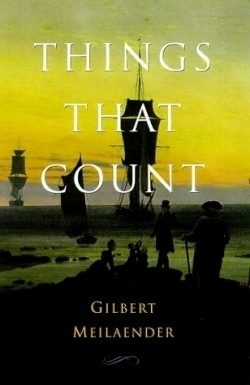Things That Count
Essays Moral and Theological
The things that count are not those distilled in the cask of self. Instead, according to Meilaender, they are those things tempered by “a truth with hard surfaces cling to and stand under.” The result of living in relation to God as both source and goal instead of by one’s desire and will is the theme of the twenty-four essays in this book.
Meilaender’s knowledge as a professor of theological ethics informs topics ranging from friendship and the bonds of marriage and family to the meaning of everyday life. The last part of the book features reviews of books by Oliver O’Donovan, David Blankenhorn, Charles Taylor, Allan Bloom, as well as reviews of C.S. Lewis biographies and by A. N. Wilson and John Beversluis.
Written over twenty years (1978-98), the essays will intrigue both believers and non-believers by means of incisive arguments compellingly presented. That Meilaender does so without sounding preachy or dogmatic adds to their force. “One has to be cautious when reflecting theologically,” he writes. “One’s tone must be less prescriptive than exploratory and interrogative.” In one essay, for example, he asks why we should be surprised that “deadbeat Dads” aren’t willing to shoulder their parental responsibilities when the culture supports the idea of a father’s superfluity.
Examples abound in the essays, many of them from his personal experience. In his essay on whether friendship between a man and woman is possible, he uses quotes from Aristotle, C.S. Lewis, Dave Barry, J.B. Priestly and a scene from “When Harry Met Sally”—all to illustrate the necessity of learning “to see beyond our secret countries.”
The theme that “we are not to think of the world…as infinitely plastic to our desire for control” is expounded forcefully and at times poetically throughout the essays. In one, he reminds parents that “a child is always a gift, and not a personal project.” On abortion, he writes that in treating a child as a commodity, “parents become godlike in the sense of theodicy (and) justifying the ways of God in our world will have to be applied to (them).” On homosexuality, he argues that “what seems “natural” to us may…be contrary to our nature as Gods creatures.”
The most beautifully rendered exposition of his premise is found in the essay entitled “C.S. Lewis and a Theology of the Everyday.” In discussing how Lewis “reflects religiously upon what is ordinary and everyday,” Meilaender reminds us that “every moment of life is momentous—touched by and equidistant from the Eternal.” Since every choice counts, we should not overlook the significance of what Lewis called “the tether and pang of the particular.”
“The Christian life hurts. God hurts,” Meilander writes. Yet in arguments ever thought-provoking and never facile, he offers a persuasive case for its still being the most meaningful way to live.
Reviewed by
Judy Hopkins
Disclosure: This article is not an endorsement, but a review. The publisher of this book provided free copies of the book to have their book reviewed by a professional reviewer. No fee was paid by the publisher for this review. Foreword Reviews only recommends books that we love. Foreword Magazine, Inc. is disclosing this in accordance with the Federal Trade Commission’s 16 CFR, Part 255.

